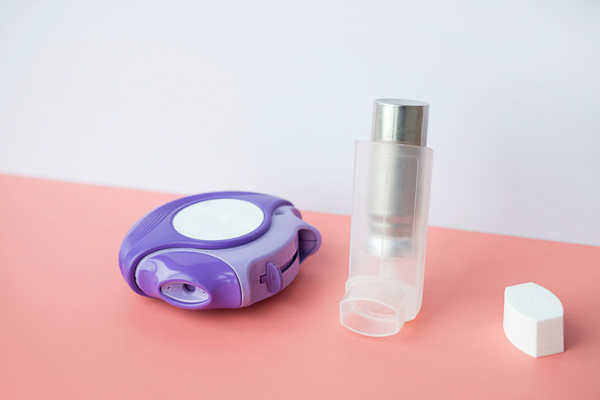
Still confused after Flovent discontinuation? What to know and do

What happens when a widely used medicine is no longer available at pharmacies across the US? Until recently, Flovent (fluticasone) inhalers were frequently prescribed to help control asthma. If you or your child relied on these products, you may be scrambling to find medicines that will help you stay healthy without breaking the bank.
What’s essential to know, and what questions should you ask your health care provider? We checked in with Dr. William B. Feldman, a physician in the Division of Pulmonary and Critical Care Medicine at Harvard-affiliated Brigham and Women’s Hospital to get answers.
Which medicines are discontinued?
In January, GlaxoSmithKline stopped producing Flovent, which was available as a prescription metered-dose inhaler (Flovent HFA) and a dry powder inhaler (Flovent Diskus).
Both contain fluticasone, a steroid. Fluticasone reduces inflammation and swelling in the airways. Both types of inhalers are FDA-approved to help prevent asthma attacks.
However, children under age 5 and adults with particularly poor lung function may not be able to use a dry powder inhaler. They may lack the lung power necessary to breathe in deeply enough to pull the medicine into their airways, Dr. Feldman explains. A metered-dose inhaler could be the best choice for them.
Now that Flovent is discontinued, is a generic product available?
Yes, the drug manufacturer has licensed an authorized generic of both Flovent products: the metered-dose inhaler and the dry powder inhaler.
However, insurance coverage may not pay for the authorized generic because it may cost an insurer more than some other branded medicines. So, you may need to switch to another brand to stay healthy. Call your insurance company to check.
What are your alternatives?
This is a good chance for you and your doctor to review your asthma treatment plan. It may be a good time to make changes.
If you had been using Flovent daily for symptom control, your doctor may recommend:
- Trying an inhaled steroid similar to Flovent. Many types of steroids will work, including beclomethasone (Qvar RediHaler), budesonide (Pulmicort Flexhaler), ciclesonide (Alvesco), and mometasone (Asmanex Twisthaler, Asmanex HFA). “These products use different molecules to do the same job as fluticasone,” says Dr. Feldman.
- Switching to a combination inhaler. New studies suggest this approach may help many people who use Flovent daily for symptom control and only use a short-acting medicine to open airways when an asthma flare occurs (see here and here). If you have intermittent asthma symptoms, talk with your provider about whether you could use a combination inhaler when you start to wheeze or have shortness of breath. This combines a medicine called formoterol with a steroid. Symbicort provides this combination in one inhaler. Although not yet approved by the FDA for this specific use, it is approved in many other countries.
What else do asthma specialists advise people to do?
If your insurance covers the authorized generic, this may be a good choice because you already know how to use the product. But what if insurance won’t cover this?
“Any other inhaled steroid should work for most — but not all — people,” says Dr. Feldman. “There are brand-name metered-dose and dry powder inhalers available, such as those mentioned above.”
Here’s what else to know and do
- Discuss whether it’s safe to switch medicines or type of device. For many people, the answer will be yes. But if your health care provider believes that a metered-dose inhaler is the best choice due to age or poor lung function, ask your insurance company for a formulary exception to cover the authorized generic fluticasone or another metered-dose inhaler. Ask your provider to make the same request.
- If you have a child under 5, you and your doctor should also ask your insurance company for a formulary exception to cover a metered-dose inhaler with a steroid.
- For anyone who needs to switch brands, your new inhaler may look and feel different and may require a new technique when you use it to get the full benefit of the medicine. “When folks switch from one type of inhaler to another, it’s very important to get proper education, ideally from their prescriber. But you can also do this online to understand how to properly use this new product,” says Dr. Feldman.
If you do switch, ask your health care provider to show you how to use the new inhaler in an in-person or virtual visit. If that’s not possible, check your technique by watching these videos created by National Jewish Health, a leading US hospital for respiratory care.
What if you’re not feeling as good on a new asthma medicine?
If you’ve switched and notice worsening symptoms or more asthma attacks, contact your health care provider, Dr. Feldman advises. “They should make sure this isn’t due to improper technique with the new device. It may not be, but it’s important to check and to keep your doctor aware of changes like these.”
Is there a difference between an authorized generic and independent generic medicines?
“With an authorized generic, the brand-name company produces the generic or licenses another company to do that. It’s the exact same medicine as the original brand-name drug. It just doesn’t have the label,” says Dr. Feldman.
Independent generics encourage price competition if several companies make them. “With authorized generics, you don’t see those price decreases to the same extent, because you typically just have one product and it’s totally controlled by the branded company,” he adds.
What if you don’t have insurance, or insurance won’t cover a medicine you need?
“These inhalers have extraordinarily high list prices — $200, $300, $400 per month for the product,” notes Dr. Feldman. Manufacturers negotiate rebates with insurers that may substantially lower the price for an insurance plan.
If you don’t have insurance, you won’t get that lower price. So, it’s worth checking prices for all options: you may find the authorized generic will cost you less than other brand-name inhalers.
About the Author

Francesca Coltrera, Editor, Harvard Health Blog
Francesca Coltrera is editor of the Harvard Health Blog, and a senior content writer and editor for Harvard Health Publishing. She is an award-winning medical writer and co-author of Living Through Breast Cancer and The Breast … See Full Bio View all posts by Francesca Coltrera
About the Reviewer

Howard E. LeWine, MD, Chief Medical Editor, Harvard Health Publishing
Dr. Howard LeWine is a practicing internist at Brigham and Women’s Hospital in Boston, Chief Medical Editor at Harvard Health Publishing, and editor in chief of Harvard Men’s Health Watch. See Full Bio View all posts by Howard E. LeWine, MD

Does drinking water before meals really help you lose weight?

If you’ve ever tried to lose excess weight, you’ve probably gotten this advice: drink more water. Or perhaps it was more specific: drink a full glass of water before each meal.
The second suggestion seems like a reasonable idea, right? If you fill your stomach with water before eating, you’ll feel fuller and stop eating sooner. But did that work for you? Would drinking more water throughout the day work? Why do people say drinking water can help with weight loss — and what does the evidence show?
Stretching nerves, burning calories, and thirst versus hunger
Three top theories are:
Feel full, eat less. As noted, filling up on water before meals has intuitive appeal. Your stomach has nerves that sense stretch and send signals to the brain that it’s time to stop eating. Presumably, drinking before a meal could send similar signals.
- The evidence: Some small, short-term studies support this idea. For example, older study subjects who drank a full glass of water before meals tended to eat less than those who didn’t. Another study found that people following a low-calorie diet who drank extra water before meals had less appetite and more weight loss over 12 weeks than those on a similar diet without the extra water. But neither study assessed the impact of drinking extra water on long-term weight loss.
Burning off calories. The water we drink must be heated up to body temperature, a process requiring the body to expend energy. The energy spent on this — called thermogenesis — could offset calories from meals.
- The evidence: Though older studies provided some support for this explanation, more recent studies found no evidence that drinking water burned off many calories. That calls the thermogenesis explanation for water-induced weight loss into question.
You’re not hungry, you’re thirsty. This explanation suggests that sometimes we head to the kitchen for something to eat when we’re actually thirsty rather than hungry. If that’s the case, drinking calorie-free water can save us from consuming unnecessary calories — and that could promote weight loss.
- The evidence: The regulation of thirst and hunger is complex and varies over a person’s lifespan. For example, thirst may be dulled in older adults. But I could find no convincing studies in humans supporting the notion that people who are thirsty misinterpret the sensation for hunger, or that this is why drinking water might help with weight loss.
Exercise booster, no-cal substitution, and burning fat demands water
Being well-hydrated improves exercise capacity and thus weight loss. Muscle fatigue, cramping, and heat exhaustion can all be brought on by dehydration. That’s why extra hydration before exercise may be recommended, especially for elite athletes exercising in warm environments.
- The evidence: For most people, hydrating before exercises seems unnecessary, and I could find no studies specifically examining the role of hydration to exercise-related weight loss.
Swapping out high calorie drinks with water. Yes, if you usually drink high-calorie beverages (such as sweetened sodas, fruit juice, or alcohol), consistently replacing them with water can aid weight loss over time.
- The evidence: A dramatic reduction in calorie intake by substituting water for higher-calorie beverages could certainly lead to long-term weight loss. While it’s hard to design a study to prove this, indirect evidence suggests a link between substituting water for high-cal beverages and weight loss. Even so, just as calorie-restricting diets are hard to stick with over the long term, following a water-only plan may be easier said than done.
Burning fat requires water. Dehydration impairs the body’s ability to break down fat for fuel. So, perhaps drinking more water will encourage fat breakdown and, eventually, weight loss.
- The evidence: Though some animal studies support the idea, I could find no compelling evidence from human studies that drinking extra water helps burn fat as a means to lose excess weight.
The bottom line
So, should you bump up hydration by drinking water before or during meals, or even at other times during the day?
Some evidence does suggest this might aid weight loss, at least for some people. But those studies are mostly small or short-term, or based on animal data. Even positive studies only found modest benefits.
That said, if you think it’s working for you, there’s little downside to drinking a bit more water, other than the challenge of trying to drink if you aren’t particularly thirsty. My take? Though plenty of people recommend this approach, it seems based on a theory that doesn’t hold water.
About the Author

Robert H. Shmerling, MD, Senior Faculty Editor, Harvard Health Publishing; Editorial Advisory Board Member, Harvard Health Publishing
Dr. Robert H. Shmerling is the former clinical chief of the division of rheumatology at Beth Israel Deaconess Medical Center (BIDMC), and is a current member of the corresponding faculty in medicine at Harvard Medical School. … See Full Bio View all posts by Robert H. Shmerling, MD

Ever worry about your gambling?

Are online gambling and sports betting new to your area? Are gambling advertisements catching your eye? Have you noticed sports and news shows covering the spread? Recent changes in laws have made gambling widely accessible, and its popularity has soared.
Occasional bets are rarely an issue. But uncontrolled gambling can lead to financial, psychological, physical, and social consequences, some of which are extreme. Understanding whether gambling is becoming a problem in your life can help you head off the worst of these issues and refocus on having more meaning, happiness, and psychological richness in your life. Gambling screening is a good first step.
Can you screen yourself for problem gambling?
Yes. Screening yourself is easy. The Brief Biosocial Gambling Screen (note: automatic download) is a validated way to screen for gambling disorder. It has three yes-or-no questions. Ask yourself:
- During the past 12 months, have you become restless, irritable, or anxious when trying to stop/cut down on gambling?
- During the past 12 months, have you tried to keep your family or friends from knowing how much you gambled?
- During the past 12 months, did you have such financial trouble as a result of your gambling that you had to get help with living expenses from family, friends, or welfare?
What do your answers mean?
Answering yes to any one of these questions suggests that you are at higher risk for experiencing gambling disorder. Put simply, this is an addiction to gambling. Like other expressions of addiction, for gambling this includes loss of control, craving, and continuing despite bad consequences. Unique to gambling, it also often means chasing your losses.
A yes doesn’t mean that you are definitely experiencing a problem with gambling. But it might be valuable for you to seek a more in-depth assessment of your gambling behavior. To find an organization or person qualified to help, ask a health care provider, your local department of public health, or an advocacy group like the National Council on Problem Gambling.
Are you ready for change?
Your readiness to change a behavior matters when deciding the best first steps for making a change. If someone asks you whether you want to change your gambling, what would you say?
|
I never think about my gambling. |
Sometimes I think about gambling less. |
I have decided to gamble less. |
I am already trying to cut back on my gambling. |
I changed my gambling: I now do not gamble, or gamble less than before. |
Depending on your answer, you might seek out different solutions. What’s most important initially is choosing a solution that feels like the right fit for you.
What if you don’t feel ready to change? If you haven’t thought about your gambling or only occasionally think about changing your gambling, you might explore lower intensity actions. For example, you could
- read more about how gambling could create a problem for you
- listen to stories of those who have lived experience with gambling disorder.
If you are committed to making a change or are already trying to change, you might seek out more engaging resources and strategies to support those decisions, like attending self-help groups or participating in treatment.
Read on for more details on choices you might make.
What options for change are available if you want to continue gambling?
If you want to keep gambling in some way, you might want to stick to lower-risk gambling guidelines:
- gamble no more than 1% of household income
- gamble no more than four days per month
- avoid regularly gambling at more than two types of games, such as playing the lottery and betting on sports.
Other ways to reduce your risk of gambling harm include:
- Plan ahead and set your own personal limits.
- Keep your entertainment budget in mind if you decide to gamble.
- Consider leaving credit cards and debit cards at home and use cash instead.
- Schedule other activities directly after your gambling to create a time limit.
- Limit your use of alcohol and other drugs if you decide to gamble.
What are easy first steps toward reducing or stopping gambling?
If you’re just starting to think about change, consider learning more about gambling, problem gambling, and ways to change from
- blogs, like The BASIS
- books like Change Your Gambling, Change Your Life
- podcasts like After Gambling, All-In, and Fall In, which offer expert interviews, personal recovery stories, and more.
Some YouTube clips demystify gambling, such as how slot machines work, the limits of skill and knowledge in gambling, and how gambling can become an addiction. These sources might help you think about your own gambling in new ways, potentially identifying behaviors that you need to change.
What are some slightly more active steps toward change?
If you’re looking for a slightly more active approach, you can consider engaging in traditional self-help experiences such as helplines and chatlines or Gamblers Anonymous.
Another option is self-help workbooks. Your First Step to Change is a popular workbook that provides information about problem gambling, self-screening exercises for gambling and related conditions like anxiety and depression, and change exercises to get started. A clinical trial of this resource suggested that users were more likely than others to report having recently abstained from gambling.
Watch out for gambling misinformation
As you investigate options, keep in mind that the quality of information available can vary and may even include misinformation. Misinformation is incorrect or misleading information. Research suggests that some common types of gambling misinformation might reinforce harmful beliefs or risky behaviors.
For example, some gambling books, websites, and other resources exaggerate your likelihood of winning, highlight win and loss streaks as important (especially for chance-based games like slots), and suggest ways to change your luck to gain an edge. These misleading ideas can help you to believe you’re more likely to win than you actually are, and set you up for failure.
The bottom line
Taking a simple self-screening test can start you on a journey toward better gambling-related health. Keep in mind that change can take time and won’t necessarily be a straight path.
If you take a step toward change and then a step back, nothing is stopping you from taking a step forward again. Talking with a care provider and getting a comprehensive assessment can help you understand whether formal treatment for gambling is a promising option for you.
About the Author

Debi LaPlante, PhD, Contributor
Dr. Debi LaPlante is director of the division on addiction at the Cambridge Health Alliance, and an associate professor of psychiatry at Harvard Medical School. She joined the division in 2001 and is involved with its … See Full Bio View all posts by Debi LaPlante, PhD